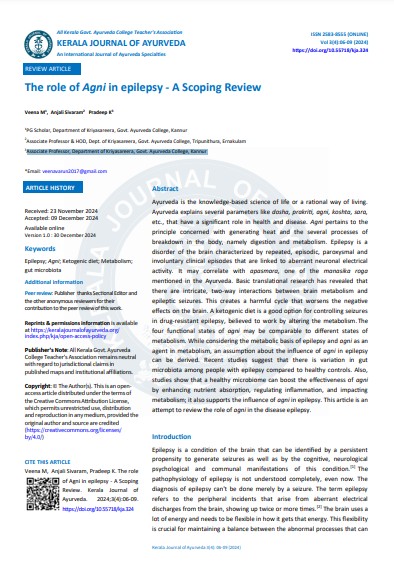The The role of Agni in epilepsy – A Scoping Review
DOI:
https://doi.org/10.55718/kja.324Keywords:
Agni, epilepsy, gut microbiota, metabolism, ketogenic dietAbstract
Ayurveda is the knowledge-based science of life or a rational way of living. Ayurveda explains several parameters like dosha, prakriti, agni, koshta, sara, etc., that have a significant role in health and disease. Agni pertains to the principle concerned with the generation of heat and the several processes of breakdown in the body, namely digestion and metabolism. Epilepsy is a disorder of the brain characterized by repeated, episodic, paroxysmal, and involuntary clinical episodes that are linked to aberrant neuronal electrical activity. It may correlate with apasmara, which is one of the manasika roga mentioned in the Ayurveda. Basic translational research has revealed that there are intricate, two-way interactions between brain metabolism and epileptic seizures. This creates a harmful cycle that worsens the negative effects on the brain. A ketogenic diet is a good option for controlling seizures in drug-resistant epilepsy, believed to work by altering the metabolism. The four functional states of agni may be comparable to different states of metabolism. While considering the metabolic basis of epilepsy and agni as an agent in metabolism, an assumption about the influence of agni in epilepsy can be derived. Recent studies suggests that there is variation in gut microbiota among people with epilepsy compared to healthy controls. Also studies are available showing a healthy microbiome can boost the effectiveness of agni by enhancing nutrient absorption, regulating inflammation, and impacting metabolism, also supports the influence of agni in epilepsy. This article aims to make an attempt to review the status of agni in the disease epilepsy.
References
Kliegman RM, III JWSG. Nelson Textbook of Pediatrics. Elsevier Health Sciences; 2019.
Das KV. Text book of Medicine: JP Medical (P) Ltd; New Delhi: 2008.
Rho JM, Boison D. The metabolic basis of epilepsy. Nat Rev Neurol. 2022 Jun;18(6):333–47.
Sharma KR, Dash B, editors. Agnivesa’s Charaka Samhita: Text with English translation and critical exposition based on Chakrapani Dutta’s Ayurveda Dipika. Reprint edition. Vol. 2. Varanasi: Chaukambha Sanskrit Series Office; 2015. [Nidana stana] C8, sloka 5.
Sreekumar T, editor. Ashtanga Hrdaya. Vol. 1. Thrissur: Harisree Hospital; 2008. [Sootrastana] C12, sloka 11.
Sharma KR, Dash B, editors. Agnivesa’s Charaka Samhita: Text with English translation and critical exposition based on Chakrapani Dutta’s Ayurveda Dipika. Reprint Edition. Vol. 4. Varanasi: Chaukambha Sanskrit Series Office; 2015. [Chikitsa stana] C15, sloka 4.
Murthy PKRS, editor. Vagbhata’s Astanga Hrdayam.Vol. 2. Varanasi: Chaukambha Krishnadas Academy; 2021. [Nidana stana] C12, sloka 1.
Chen S, Jiao Y, Han C, Li Y, Zou W, Liu J. Drug-Resistant Epilepsy and Gut-Brain Axis: an Overview of a New Strategy for Treatment. Mol Neurobiol. 2023 Dec 12;
Thakur S. Physiological Aspect of Agni and its Role in Metabolic Activities: A Review. International Journal of Medical Sciences and Pharma Research. 2023 Dec 15;9:12–4.
Sharma KR, Dash B, editors. Agnivesa’s Charaka Samhita: Text with English translation and critical exposition based on Chakrapani Dutta’s Ayurveda Dipika. Reprint edition. Vol. 4. Varanasi: Chaukambha Sanskrit Series Office; 2015. [Chikitsastana]. C15, sloka 39.
Ułamek-Kozioł M, Czuczwar SJ, Januszewski S, Pluta R. Ketogenic Diet and Epilepsy. Nutrients. 2019 Oct 18;11(10):2510.
Imdad K, Abualait T, Kanwal A, AlGhannam ZT, Bashir S, Farrukh A, et al. The Metabolic Role of Ketogenic Diets in Treating Epilepsy. Nutrients. 2022 Nov 29;14(23):5074.
Chande A, G AS, Changath S. Relation Between Gut Brain Axis and Agni. Int Res Journ AY. 2022 Jun; 5(6):77-81
S A, Mv A. CONCEPT OF AGNI -AN ANALYSIS. The Journal of research in Indian medicine. 2024 Jan 31;July to December 2021-Vol-16:26.
Prabhakaran V, Yadav CR. Genomic Insights into the Correlation between Gut Microbiota and Dehagni A Review. International Research Journal of Ayurveda and Yoga. 2024 Sep 3;7(8):8–12.
Al-Beltagi M, Saeed NK. Epilepsy and the gut: Perpetrator or victim? World Journal of Gastrointestinal Pathophysiology. 2022 Sep 22;13(5):143.
Dahlin M, Prast-Nielsen S. The gut microbiome and epilepsy. EBioMedicine. 2019 May 31;44:741.
Zhang Y, Zhou S, Zhou Y, Yu L, Zhang L, Wang Y. Altered gut microbiome composition in children with refractory epilepsy after ketogenic diet. Epilepsy Res. 2018 Sep;145:163–8.
Lee H, Lee S, Lee DH, Kim DW. A comparison of the gut microbiota among adult patients with drug-responsive and drug-resistant epilepsy: An exploratory study. Epilepsy Res. 2021 May;172:106601.
Gong X, Liu X, Chen C, Lin J, Li A, Guo K, et al. Alteration of Gut Microbiota in Patients With Epilepsy and the Potential Index as a Biomarker. Front Microbiol. 2020;11:517797.





